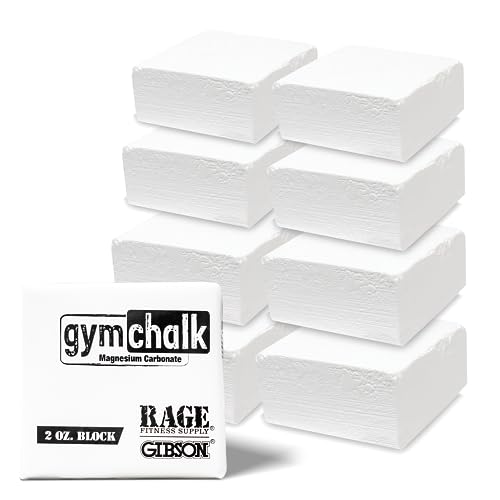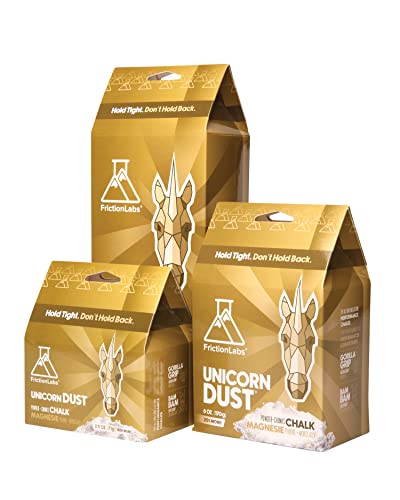Chalk has become an inherent part of many athletes’ lives, from weightlifters to CrossFit gymnasts to climbers.
Its primary purpose is to offer a better grip, destroy bacteria and prevent sweat while improving friction between the palms and the rock or bar.
Before you decide which chalk you should be using, you must first know what is climbing chalk made of, its inner workings, and whether it can impact your health.
What Is the Critical Component of Climbing Chalk
Chalk is typically made of magnesium carbonate, which is a broken-down version of Magnesite. It plays a vital role in water absorption without any breakage. As a result, it’s widely used by rock climbers with the problem of sweaty hands.

But the point here is even though chalk is prepared from magnesium carbonate, the ones used for rock climbing certainly comes with other things to improve its functionality.
Several manufacturing houses add other minerals or components for staying ahead of the competition. Some of the most common elements added to climbing chalk include essential oils, limestone, and drying agents.
Some more expensive versions of climbing chalk claim to have purer magnesium carbonate forms that fill up the skin pores much effectively. Thus, the absorption ability is more powerful. But this is nothing but a finer class of the same elements only.
Often, another element is used for making climbing chalk for its better efficiency in moisture absorption. And it is called Upsalite. Absorbing moisture is the main reason why rock climbers use chalk.
What Is Upsalite?
It’s been about a decade since a new element known as mesoporous magnesium carbonate was discovered and patented in 2017 as Upsalite.

It is a better version of the same chemical. Still, the only difference lies in the fact that it has a greater surface area compared to any other material available on earth.
This is not only an exciting discovery in the world of science but for rock climbers as well. This is because a large surface area invariably means the element will be better able to absorb moisture.
What Role Does Chemistry Play in the Composition of Climbing Chalk?
Magnesium lies at the 12th position on the periodic table and is armed with two valence electrons. Now it wants to give off 1 electron while Carbonate needs to gain 2 electrons.
The end product thus formulated, magnesium carbonate, has better water absorption power and is relatively insoluble. Climbing chalk is derived from Magnesite which is magnesium carbonate mixed with carbonate crystals and iron.
Magnesite as an ionic bond
Magnesite is heated to remove the carbonate and iron. but since it is an ionic bond, it cannot break the bond between carbonate and magnesium.
It’s worth mentioning that an ionic bond is formed between two oppositely charged molecules that cannot be broken apart easily.

Preparation of climbing chalk from magnesite
As the magnesite goes through purification of the carbonate and iron crystals, it takes a solid form. This solid block can be used as a block or maybe crushed into fine powder.
It can also be prepared in the laboratory by a reaction between soluble magnesium salts like sodium bicarbonate and magnesium chloride.
When these two salts react between themselves, it gives way to table salt or sodium chloride, carbon dioxide, and of course, magnesium carbonate or climbing chalk.
Magnesium carbonate water
The reason why magnesium carbonate remains insoluble in water is due to lattice energy or the energy generated due to the hydration within a solution or when the energy required for breaking the ion’s lattice structure becomes greater compared to the hydration energy.
As a result, when magnesium carbonate is placed in water, the released energy is not adequate enough for breaking up carbonate or magnesium.
Since this element is not soluble in water and sweat mainly comprises of water, magnesium carbonate prevents hands from getting sweaty.

What Are the Different Types of Climbing Chalk?
Four variants of chalk are commonly used in rock climbing, and they are:
- Block chalk
- Loose or powder chalk
- Liquid chalk
- Powder chalk in a cloth bag
- 【 EXCELLENT GRIP 】: Rage Fitness Gym chalk blocks are designed to provide excellent grip enhancement during weightlifting, gymnastics, rock climbing, and other activities that require a strong...
- 【 PREMIUM MAGNESIUM CARBONATE 】: With a commitment to excellence, Rage Fitness ensures that our workout chalk meets the needs and expectations of athletes and fitness enthusiasts. Our fitness...
- 【 REDUCE SLIP】: Our chalk blocks for the gym help reduce slip by improving grip strength. A secure grip is crucial to maintaining control and avoiding accidents or mishaps when using weights or...
- 【 EASY TO USE 】: These workout chalk blocks offer easy application, allowing users to apply the chalk quickly and efficiently. The blocks are designed to minimize mess, preventing excess chalk...
- 【 SUITABLE FOR VARIOUS ACTIVITIES 】: Rage Fitness chalks are suitable for a wide range of activities, including weightlifting, powerlifting, cross-training, rock climbing, and other sports....
- GAME CHANGING GRIP: Don’t limit yourself because of bad grip. Overcome grip problems caused by sweat, rain, humidity, and oils or sunscreen. Our high purity Magnesium Carbonate makes a single...
- SKIN FRIENDLY GRIP: Made in Colorado, USA with the highest purity pharmaceutical-grade ingredients. Non-toxic, silica-free chalk that is safe for all skin types. Healthy Skin = Better Performance.
- PEAK PERFORMANCE: A bit of moisture can be the difference between success and failure. Our high purity chalk lasts longer so you can keep pushing to that next hold instead of stopping to chalk up....
- TRUSTED BY THE BEST: Friction Labs is the only chalk endorsed by champions in multiple sports like rock climbing, tennis & powerlifting. Our chalk provides the long lasting moisture absorption you...
- COMPLETE THE REGIMEN: Looking for maximum grip and performance? Learn from the pros: Activate your grip with Secret Stuff Liquid Chalk base layer before you climb or lift. Then add loose chalk to...
- Strong and Long Lasting: A perfect gym accessory for men and women to create a stronger grip
- Workout Chalk for Weightlifting: Liquid chalk for weight lifting to keep your hands dry
- Sport Chalk: Create a liquid grip when rock climbing, dancing, doing gymnastics, or working out
- No Blisters: Workout chalk to improve performance & prevent injury when gripping poles or lifting
- Travel Bottle: Weightlifting chalk, rock climbing chalk for the gym, your home or on the go
- KEEP YOUR HANDS DRY: Avoid losing grip due to sweat, rain, humidity, and oils/sunscreen with our refillable chalk ball. The ultimate grip and hand protection for any activity such as climbing or...
- SKIN FRIENDLY: Our chalk ball for climbing is made in the USA and free of any fillers and artificial drying agents that can harm your skin. Our refillable chalk sock is clean, non-toxic, and safe for...
- SIMPLE & MESS-FREE: Friction Labs climbing chalk ball comes pre-filled with our premium chalk. The permeable bag with an adjustable drawstring makes for easy refills and mess-free application.
- BRING IT ANYWHERE: Whether our chalk ball is with you in your chalk bag during a climb, or left it in your loose chalk bucket. Our gym chalk ball can be taken anywhere so you can maintain optimal grip...
- TRUSTED PERFORMANCE: Our chalk is endorsed by over 100 pros in a variety of sports - weightlifting and powerlifting, gymnastics, rock climbing, CrossFit, and more. Wherever you need to maintain a...
Last update on 2025-01-17 // Source: Amazon Affiliates
Going for a chalk block is typically the cheapest of all options. When manufacturers develop chalk in the form of a block, the processing is cut down greatly.
This is because there is no need to crush or filter. But if you try doing it, it may become messy as you will first have to crush it down to put it inside a chalk bag.
On the other hand, liquid chalk is the crushed version of the block chalk that has been dissolved in a suitable solvent like alcohol. For a seamless application, it has to be squeezed on the palm the way you apply any lotion on your palms.
Then, you must allow it some time to dry, and you will notice that soon it transforms into a smooth and thick layer of climbing chalk that stays on the palms for a long.
Loose chalk is the most common option used for climbing. It is available in two popular forms, either as a powder with chunks or fine powder. Both of these consistencies have their distinct pros and cons.
But perhaps the most problematic disadvantage of loose chalk is that it leads to an unwanted dust cloud while used. Moreover, it can also escape out of your climbing chalk bag and leave behind a mess.
To combat these issues, you can opt for chalk balls that are not refillable. And these are often available in new chalk bags. Alternatively, you may also get yourself a refillable bag.
The Bottom Line
When you know what climbing chalk is made of, you will see that it is safe for humans and doesn’t cause any health hazards.
You may even consume tiny amounts of climbing chalk without any problem. But the real hazard lies when you end up inhaling some of it.
Even though a small amount may not cause any issues, in a rock-climbing gymnasium, there are copious amounts of dust everywhere around. In such instances, chalk balls or liquid chalk can be your only savior.










